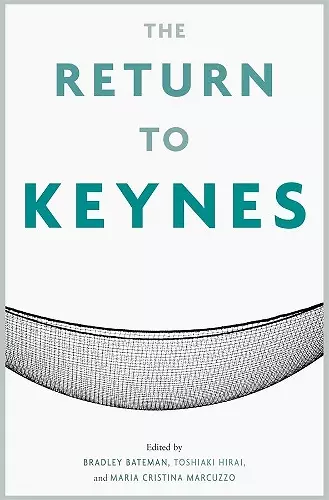The Return to Keynes
Bradley W Bateman editor Maria Cristina Marcuzzo editor Toshiaki Hirai editor
Format:Hardback
Publisher:Harvard University Press
Published:17th Mar '10
Currently unavailable, and unfortunately no date known when it will be back

During the 1990s, John Maynard Keynes, and Keynesian economics, were declared to be well and truly dead. Then came the financial and economic crises of 2008 and they were reborn as a way of understanding economies with significant unemployment. This excellent collection of essays, brought together by three prominent scholars of Keynes and Keynesian policy, will be a convenient way for those who have forgotten Keynesian economics to refresh themselves, and for others to learn for the first time. -- Craufurd Goodwin, Duke University This fascinating collection of papers addresses the current status and relevance of Keynes from a number of perspectives: the return of macroeconomic policy activism, the state of modern macroeconomics, the recent scholarship of Keynes's life and work, and some elements of Keynes's work that might be relevant to the current crisis. The authors' backgrounds are diverse and their scholarship often cutting-edge. A fine guide to the present state of play. -- D.E. Moggridge, University of Toronto It is a basic truth in the history of economics that great ideas never die. They attain this permanence because they are shaped by both the internal demands of economic theorizing as well as the external realities of the economy. The Return to Keynes, edited by three distinguished scholars, testifies to this truth and demonstrates that doing the history of economics is a part of doing economics well. Keynesian macroeconomic policy as a tool for stabilization is now firmly fixed in the toolbox of economics. -- Yuichi Shionoya, Hitotsubashi University
Keynesian economics has recently seen a rebirth, most dramatically illustrated when central banks pumped billions of dollars of liquidity into the world’s financial system to address the crises of confidence, illiquidity, and insolvency triggered by the sub-prime lending crisis. The contributors assess this new era in economic policy making.
Keynesian economics, which proposed that the government could use monetary and fiscal policy to help the economy avoid the extremes of recession and inflation, held sway for thirty years after World War II. However, it was discredited after the stagflation of the 1970s, which not only proved resistant to traditional Keynesian policies but was actually thought to be caused by them. By the 1990s, the anti-Keynesian counter-revolution seemed to reach its pinnacle with the award of several Nobel Prizes in economics to its architects at the University of Chicago.
However, with the collapse of the dot-com boom in 2000 and the attacks of 9/11 a year later, the nature of macroeconomic policy debate took a turn. The collapse prompted a major shift in macroeconomic policy, as the Bush administration and other governments around the world began to resort to Keynesian measures—both monetary and fiscal policies—to stabilize the economy. The Keynesian rebirth has been most dramatically illustrated during the past year when central banks have pumped billions of dollars of liquidity into the world’s financial system to address the crises of confidence, illiquidity, and insolvency that were triggered by the sub-prime lending crisis. The Return to Keynes puts Keynesian economics in a fresh perspective in order to assess this surprising new era in economic policy making.
During the 1990s, John Maynard Keynes, and Keynesian economics, were declared to be well and truly dead. Then came the financial and economic crises of 2008 and they were reborn as a way of understanding economies with significant unemployment. This excellent collection of essays, brought together by three prominent scholars of Keynes and Keynesian policy, will be a convenient way for those who have forgotten Keynesian economics to refresh themselves, and for others to learn for the first time. -- Craufurd Goodwin, Duke University
This fascinating collection of papers addresses the current status and relevance of Keynes from a number of perspectives: the return of macroeconomic policy activism, the state of modern macroeconomics, the recent scholarship of Keynes's life and work, and some elements of Keynes's work that might be relevant to the current crisis. The authors' backgrounds are diverse and their scholarship often cutting-edge. A fine guide to the present state of play. -- D.E. Moggridge, University of Toronto
It is a basic truth in the history of economics that great ideas never die. They attain this permanence because they are shaped by both the internal demands of economic theorizing as well as the external realities of the economy. The Return to Keynes, edited by three distinguished scholars, testifies to this truth and demonstrates that doing the history of economics is a part of doing economics well. Keynesian macroeconomic policy as a tool for stabilization is now firmly fixed in the toolbox of economics. -- Yuichi Shionoya, Hitotsubashi University
ISBN: 9780674035386
Dimensions: unknown
Weight: unknown
320 pages